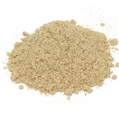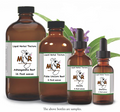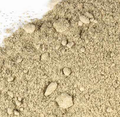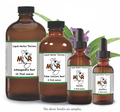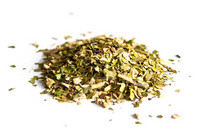 Loading... Please wait...
Loading... Please wait...- Home
- Herbal Teas
- Medicinal Remedy Teas
- Thyroid, Graves' Disease & Hyperthyroidism Tea
- Home
- Herbal Teas
- Thyroid, Graves' Disease & Hyperthyroidism Tea
Thyroid, Graves' Disease & Hyperthyroidism Tea
Product Description
This Herbal Tea is blended to aid in Thyroid, Graves' Disease & Hyperthyroidism, Hashimoto's and Hypothyroidism
Many people with thyroid and autoimmune thyroid conditions are interested to know which herbs can help restore their health back to normal. Of course there isn’t a single herb or nutritional supplement that can accomplish this on its own. However, when used in combination with other factors, such as eating well, managing stress, and minimizing one’s exposure to toxins, some herbs can be extremely helpful not only in managing the symptoms of both hypothyroidism and hyperthyroidism, but they can also be an important part of restoring someone’s health back to normal.
As you’ll soon find out, not all of these herbs are necessary to take. Some of these herbs are beneficial for hyperthyroidism, while others should be taken when someone has a hypothyroid condition. Some of these herbs can be taken with either condition, while others are contraindicated for certain conditions. For example, one of the herbs I took while on a natural thyroid treatment protocol was Bugleweed, which can be extremely helpful for hyperthyroid conditions, but is contraindicated for hypothyroidism. Similarly, the herb Bladderwrack can be taken by many some who have a hypothyroid condition, but is contraindicated for someone who has hyperthyroidism.
I don’t recommend for anyone to just randomly begin taking these herbs, as they first should consult with a competent natural healthcare professional. After all, different people will require different herbs, as well as different dosages. And while these herbs are natural, this doesn’t mean that there aren’t risks involved when taking them, which is yet another reason not to self-treat your thyroid condition. With that being said, let’s take a look at the following herbs that might be able to help restore your health back to normal:
1. Eleuthero. This herb is one that many people with both hypothyroidism and hyperthyroidism can take (including both Hashimoto’s Thyroiditis and Graves’ Disease). The herb doesn’t directly affect the thyroid gland, but instead affects something called the hypothalamic-pituitary-adrenal (HPA) axis, which helps the body to adapt to stressful situations, and this herb also provides immune system support. For people with adrenal problems, which is common in people with thyroid and autoimmune thyroid conditions, eleuthero is a very beneficial herb. Many people who have problems with their adrenal glands can benefit from taking this herb. Eleuthero is considered to be an adaptogenic herb, and some other examples of adaptogenic herbs include ashwagandha, rhodiola, and maca.
2. Bladderwrack. This herb is for people with hypothyroidism. Taking this herb, along with other herbs and supplements, plus incorporating other lifestyle factors, can help restore the health of someone who has hypothyroidism. This can mean that some people who have been taking synthetic or natural thyroid hormone may eventually be able to stop taking these drugs with the help of this herb (under the supervision of their medical doctor of course). In fact, Dr. Janet Lang, who is the founder of Restorative Endocrinology, talks about this herb as being “liquid magic” for people with hypothyroid conditions. When combined with the herb ashwagandha this herb can stimulate the production of thyroid hormone in some people with hypothyroid conditions. I’m not suggesting that most people with hypothyroid conditions can stop taking thyroid hormone medication and substitute this with bladderwrack and ashwagandha, as one also needs to address the underlying cause of the condition.
This herb does include iodine, and as a result, some people with Hashimoto’s Thyroiditis don’t do well when taking this herb. However, some people with Hashimoto’s don’t have a problem taking this herb, although many will still choose to avoid it out of fear that it will exacerbate their condition. I don’t consider this an “essential” herb for most people with hypothyroidism or Hashimoto’s Thyroiditis, but for someone who wants to follow a natural treatment protocol and isn’t taking synthetic or natural thyroid hormone, taking Bladderwrack might be beneficial. This herb shouldn’t be taken by those with hyperthyroidism, and is contraindicated in women who are pregnant or breastfeeding.
3. Ashwagandha. Yet another adaptogenic herb for people with thyroid and autoimmune thyroid conditions that has many different benefits. And this is one of the great things about most herbs, as they usually benefit the body in many different ways if used appropriately. For example, ashwagandha helps the body to cope with stress by affecting the HPA-axis, and is also beneficial for the immune system. It also has some other benefits as well, as it has some anti-inflammatory effects, and is also used as a tonic for children. I’ve written a separate article entitled “Ashwagandha and Thyroid Health“.
4. Licorice Root. saliva cortisol results prove slightly low cortisol at one time, licorice root, especially with the key ingredient glycyrrhizin, may have possible benefit. It is said to extend the life of the cortisol you do have by slowing down its breakdown to cortisone, and thus, making it more available.
5. Gotu Kola. a great apoptogenic herb that supports brain health, nerves, and mood. It is considered one of the safer apoptogenic herbs
In addition to these five wonderful herbs, we wanted to briefly mention two additional “herbs that help with hypothyroidism, as well as those with a hyperthyroid condition.
Hashimoto’s Disease Natural Remedies
Effectively treating Hashimoto’s disease includes making the following changes to your diet and lifestyle:
- Removing immune reacting foods: gluten, food sensitivities, etc.
- Consuming gut healing foods
- Supplementing with helpful nutrients, herbs and probiotics
- Boosting the body’s ability to detox
- Reducing and managing stress long-term
1. Remove Immune Reacting Foods From Your Diet
You must let your system rest and your gut heal if you want to normalize immune system and thyroid gland functions. Here are the most important steps to controlling Hashimoto’s disease using your diet:
-
Eliminate Gluten: If you have hypothyroidism or Hashimoto’s disease, go gluten-free to start. This might seem tough, overwhelming and like a big change compared to what you’re used to, but it’s really important. I recommend going gluten-free and overall grain-free for a period of time — a total of about 90 days — and then following a gluten-free diet long term.
-
Consider going grain-free: Gluten is one of the biggest autoimmune and allergen culprits, but it’s not the only one. Look for other foods that can act like gluten in your body and contribute to gut inflammation. Dairy products that are pasteurized/homogenized, plus regular unsprouted grains, are two of these food groups. In centuries past, dairy foods were eaten raw and ancient grains were easier to digest and provided more absorbable nutrients because they were soaked, sprouted and fermented. Today this practice has mostly been lost, and refined or bleached flours are consumed in higher quantities than ever before.
-
Avoid fast foods and too much added sugar: Excess sugar in your diet will undoubtedly cause inflammation of the gut, not to mention contribute to blood sugar fluctuations, weight gain, nervousness and other symptoms. Fast foods and packaged products made with refined oils (including vegetable oils like safflower, sunflower, canola and corn oil) are also inflammatory and very low in nutrients.
2. Consume Gut Healing Foods
The best diet to follow if you have hypothyroidism or Hashimoto’s disease is a healing diet that’s high in vegetables, fruits, as well as nutrient-packed foods like bone broth and organic meats. These are the foods that are easiest for your body to digest and least likely to cause allergic or autoimmune reactions.
Ultimately the type of diet you should follow is something very similar to the GAPS diet plan and protocol. This is an ancient diet that’s full of fruits, vegetables and organic meats which has been found to be effective for many people struggling with inflammatory bowel disease (IBD) and autoimmune disorders. Eating things like bone broth soup is fantastic, as well as eating probiotic-rich foods (yogurt that’s been fermented for 24 to 29 hours, as well as ancient, fermented dairy products like kefir).
Here are the top foods in a hypothyroidism diet and to start the healing process:
- Fresh veggies and fruit: These are high in antioxidants, vitamins and minerals and fiber. Fiber helps with digestive health, improves heart health, balances blood sugar levels and supports a healthy weight. Antioxidants and other nutrients fight inflammation and prevent deficiencies
- Wild-caught fish: These provide anti-inflammatory omega-3 fatty acids EPA/DHA that are essential for hormone balance and thyroid function
- Coconut oil: Provides medium-chain fatty acids in the form of caprylic acid, lauric acid and capric acid that support a healthy metabolism, increase energy, nourish the gut and fight fatigue
- Seaweeds: Natural sources of iodine that help prevent deficiencies which disturb thyroid function
- Probiotic-rich foods: These include kefir, organic goat’s milk yogurt, kimchi, kombucha, natto, sauerkraut and other fermented veggies. Probiotics help repopulate the gut with beneficial bacteria and can really help support the healing of the gut and immune system
- Sprouted seeds and beans/legumes: Flax, hemp and chia seeds provide ALA, a type of hormone-balancing omega-3 fat while beans and legumes are high in fiber and certain minerals
- Bone broth: helps heal the gut lining by providing collagen, amino acids l-proline and l-glycine, and nutrients such as calcium, magnesium, phosphorus and silicon.
Disclaimer - The information presented herein by Mountain Maus’ Remedies is intended for educational purposes only. These statements have not been evaluated by the FDA and are not intended to diagnose, cure, treat or prevent disease. Individual results may vary, and before using any supplements, it is always advisable to consult with your own health care provider.
Information from naturalendocrinesolutions.com


